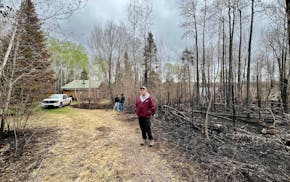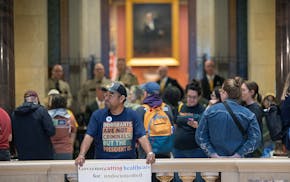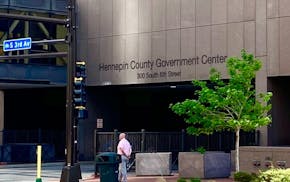For hours every afternoon, Wayne Johnson crisscrosses subdivision streets, knocking on doors and ringing doorbells, leaving leaflets in screen door handles and sometimes giving his pitch to voters.
Johnson, a Republican running for the Legislature in a hotly contested open seat in the east metro against DFLer Lucia Wroblewski, is largely working on his own around Lake Elmo and Afton. He's relying on a list of voters supplied by the state Republican Party with no army of volunteers, just one other person, and putting a lot of miles on his slip-on Skechers shoes. He says he tries to engage with everyone, without regard for party affiliation.
"I talk to everybody," he said. "Let's have a conversation."
For Republicans and the groups supporting them, a bout of early-summer optimism about flipping the state for former President Donald Trump has narrowed to the ambition of winning back the state House of Representatives by flipping a few districts.
Yet Minnesota Republican Party State Chair David Hann insists the Trump campaign has not given up on the state.
"The Trump campaign has been very interested in Minnesota," Hann said. "They have been heavily engaged and continue to be so. They believe it's a winnable race, I believe it is too."
Others aren't so sure the Trump campaign is still engaged.
"The national campaign can tend to be focused more on other states than Minnesota," said Jake Coleman, senior adviser of Americans for Prosperity Action in Minnesota, a libertarian-leaning group that does not coordinate with candidates.
Only a few months ago, Republicans were optimistic about their chances in Minnesota, even before President Joe Biden's poor debate performance.
Despite a major cash advantage for the Minnesota DFL over the Minnesota Republican Party, there were exploitable fractures. An unpopular incumbent wasn't too exciting for Democrats. Some progressives were demoralized by his support for Israel's war in Gaza, and almost 46,000 Democrats cast "uncommitted" primary ballots in protest. More than 22,000 others voted for Rep. Dean Phillips or self-help author Marianne Williamson.
The Trump campaign signaled seriousness about Minnesota when James Blair, the campaign's political director, wrote in a memo in June that it would open eight offices in the state in July. By the end of the summer, the Trump campaign claimed 13 offices in Minnesota.
But most of those are Republican county or congressional offices doing double-duty as Trump campaign offices, some with just a small Trump sign or two in the window along with larger signs for the local congressional races.
The offices are low-key, one in an alley behind a liquor store on the outskirts of Mankato and another in an out-of-the-way Lakeville office park without any Trump or Republican Party signage.
In those offices, the Republican Party says it's trained 1,400 "Trump Force" volunteer captains, with 400 of them trained in just the last two weeks.
On the other side, the DFL Coordinated Campaign and the Harris campaign said they have 24 offices and more than 100 paid staff members. They've signed up 14,000 volunteers since the end of July, knocked on 100,000 doors and made 67,000 phone calls.
Hann was skeptical about Democrats' reports of voter contacts and volunteers — numbers that, unlike campaign finance information, do not have to be verified with any regulator.
"It's in the category of rumors and talk," Hann said.
If it is true, Democrats' push has not yet had a huge impact on public opinion in Minnesota, he said.
"If this was all as great as Democrats are telling you, they'd be way up in the polls," Hann said.
Local focus
Americans for Prosperity, the libertarian-leaning group that supports Republican candidates, is sitting out the presidential race.
Instead, it is focusing its efforts on 14 legislative races, with plans to canvass neighborhoods just about daily until the election. Coleman said a mix of paid staff and volunteers aim to contact between 300,000 and 400,000 Minnesota voters by Election Day.
"It's a lot of pounding the pavement" to get out information about their preferred candidates, Coleman said.
The pressure is on, he said, because some of the races that delivered Democrats their current state government trifecta were won by just a couple hundred votes.
Hann would not discuss specifics of where the state GOP is focusing its efforts or how many voters it hopes to contact by Election Day, saying he did not want to tip his hand to Democrats, but said the party is targeting its on-the-ground contacts with voters on a handful of legislative races.
"Everybody knows if Republicans win an additional four seats they become the majority," he said. But he said the party is interested in competing further up the ballot too.
"We want to win them all," Hann said.
For Americans for Prosperity's part, Coleman said he didn't think the group has the resources to make a dent in congressional races, much less against Democratic Sen. Amy Klobuchar.
"I don't think we could put in the resources necessary to push those over the edge," he said, even if he thought a race could be won.
In races in which his group is involved, Coleman said, it seems the candidates themselves are doing most of the work.
"I haven't heard a lot about the state party or the Trump campaign," Coleman said.
First-time candidate Josh Jungling, a Republican running in a Coon Rapids and Anoka district against DFL Rep. Zack Stephenson, said he has gotten some helpful pointers from the House Republican Campaign Committee, the arm of the state party working on legislative races.
"It's all those little things when you're starting to run for public office," Jungling said. "Like, how do you put up a four-by-eight[-foot] sign?"
Still, he said, the hard work of going door to door to persuade people to vote can be a little lonely for a legislative candidate.
"There's a lot of times you're just out there by yourself just knocking on doors."

Surrounded by a charred landscape, a small cabin sits unscathed

Minnesota's budget deal threatened over plans to undo health care for undocumented adults

Twin Cities teacher lured to park by online vigilante jailed on child porn charges

